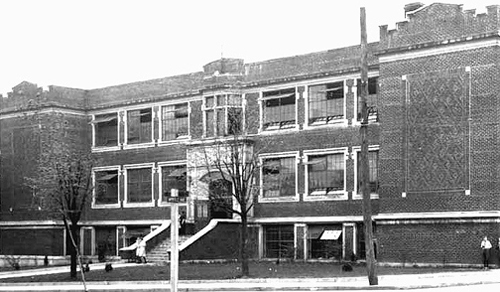My recent column concerning Miss Dora Huddle, former Tennessee History teacher at Junior High School, prompted a note from Betty Durman, saying the article brought back many memories of her first years in Johnson City.
“As a student at the University of Tennessee,” said Betty, “I had Dr. Folmsbee (co-author of The Story of Tennessee) as my professor for Tennessee History and American Diplomatic History. The professor was inaudible if you did not get a front row seat in his class at Ayers Hall on the ‘Hill.’ He was dry as a bone, but like Miss Dora, he had a heart of gold lurking below that gruff surface.”
Once when Ms. Durman inadvertently underestimated the number of pages of required reading she had accumulated for his course, the professor kindly permitted her to return to the library to re-total the pages. She subsequently received an “A” for the subject. When her instructor asked her what she planned to do after graduation, she responded that she wanted to teach in Johnson City. She recalled that his eyes lit up and he praised Miss Huddle as a teacher. She was instructing at Junior High School.

Betty further noted: “I got a last minute call from school superintendent Mr. (Howard) McCorkle, offering me a job teaching science at North Junior High School. My fiancé was already in Johnson City, so I jumped at the opportunity. When I walked into the school in 1964 as a 21-year-old, I quickly realized that Dora Huddle was a force to be reckoned with among the downstairs teachers. The school staff was pretty much divided between the upstairs and downstairs groups and the line was evident even to a newcomer. My room was upstairs, but I felt close to the two groups and they both let me circulate between them.”
Betty remarked that nearly everyone on the staff was much older than she, with the exception of a teacher named Sandy Smith. The Huddle sisters were especially kind to her, recalling that Dora habitually wore red and Louise frequently adorned violet or purple. She commented that Dora would have found modern educational psychology difficult to deal with because she complimented students only when they performed well, not when they just achieved minimum requirements.
Ms. Durman humorously recalled an expression Dora uttered in the privacy of the teacher’s lounge. She would say that someone needed to be ‘bored for the simples,’ a century-old slang term meaning ‘to have one’s skull drilled to cure lunacy.” This was an occasional axiom heard on the weekday old-time radio program, Lum and Abner. When the chorus became too loud in the room directly above Dora’s, her eruptions were a regular occurrence,” said Betty, “especially when they sang ‘Little Drummer Boy’ one time too many just before Christmas every year.
“I came to be her friend and her kindness extended to my son when he was born,” said Betty. “I spent many pleasant visits at the home she shared with her sister Louise and got to know her sister Anne Hoilman when she substituted at the school.”
Betty’s note ended with these expressive words: “Miss Dora and Dr. Folmsbee are fine examples of teachers who had no visual aids and did not endeavor to entertain their charges. They simply knew their subject extremely well, told things like they were, assigned you to find out for yourself and thereby left an indelible imprint on their students. I can say of both teachers that beneath that gruff exterior laid a heart full of caring and kindness. Both helped me in ways I will always remember fondly. Thank you for remembering her.”

Comments are closed.